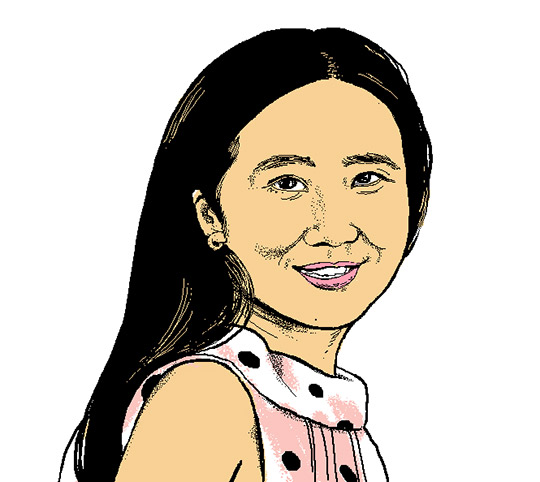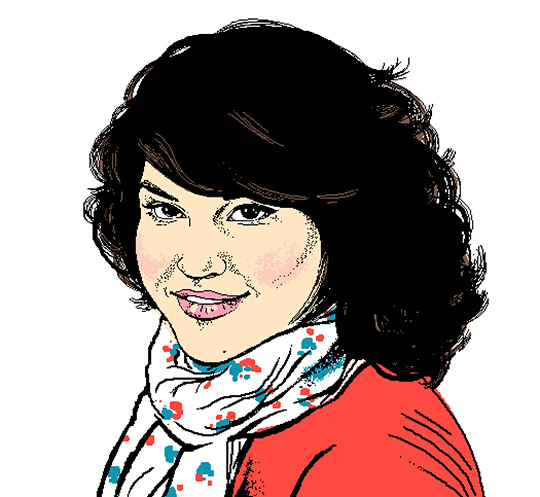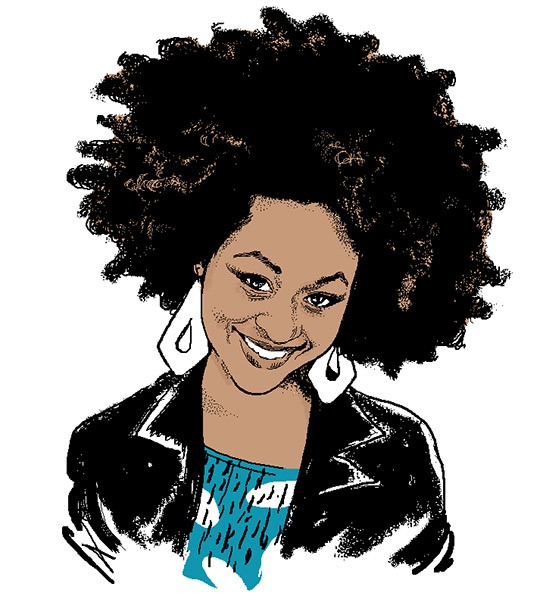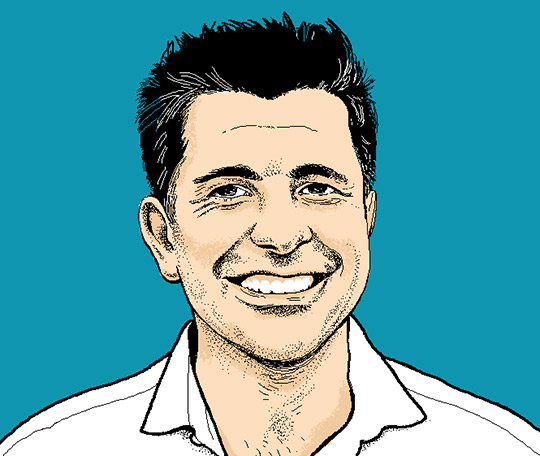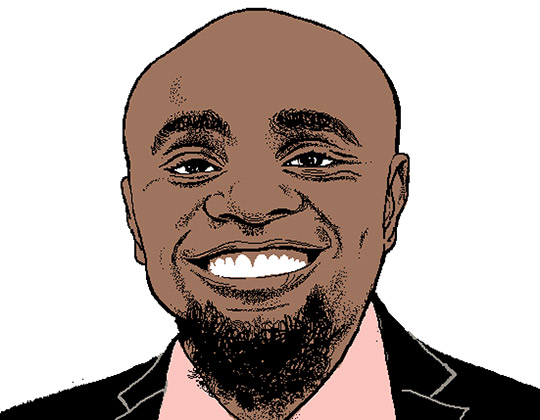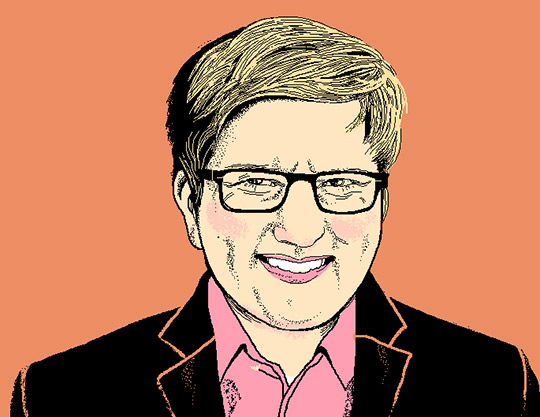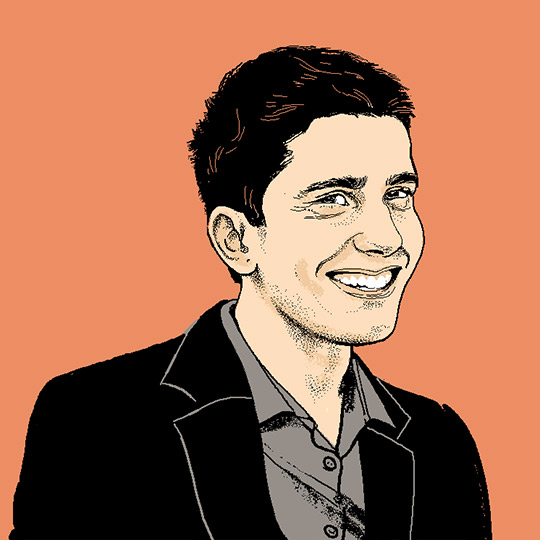Early Risers
Starting with this issue of TC Today, we introduce recent graduates who are shaping their fields. First up are some young alumni working in higher education.
By SIDDHARTHA MITTER
Henan Cheng Quantifying the Benefits of Social Justice
As a designer of cars and trucks in Hubei Province in her native China, Henan Cheng (Ed.D. ’10) learned that cost-effective design is critical to mass production.
Now as a postdoctoral fellow at Teachers College’s Center for Benefit- Cost Studies of Education (CBCSE), Cheng is bringing that same focus to the education policy arena.
Cheng is a member of a federally funded team led by CBCSE Co- Director Henry Levin, William H. Kilpatrick Professor of Economics and Education, that is assessing the cost-effectiveness of decades’ worth of government education projects.
The team’s first report, which came out last year, found some staggering discrepancies in spending on different programs to increase high school completion.
“In some cases, it cost $100,000 to keep one student from dropping out,” Cheng says. “In others it cost only $700.”
The project’s second phase, on early literacy programs, is now under way. The team is also building a cost-effectiveness assessment tool for funders and school districts. Its engine will be a database of key factors such as regionally adjusted salary levels and facilities costs. The tool also will have a Web interface.
“Evaluations report on whether a program was effective, but they seldom mention its cost,” Cheng says. “But policymakers need to know what they can afford.”
Cheng, who also serves as Assistant Director of TC’s Center on Chinese Education, received her doctorate in International Educational Develop¬ment, with a concentration in finance and planning. She wrote her disserta¬tion on the educational barriers that confront China’s migrant children, particularly those from ethnic minority populations. For that work, she spent several months conducting interviews, focus groups and school visits in Kunming, the capital of Hunan Province, a region in China’s southwest that borders Vietnam, Laos and Myanmar.
Currently Cheng is studying the education of children left behind in rural Sichuan by parents who have migrated to industrial areas. She is also holding discussions with colleagues in China about the possibility of setting up a cost-benefit studies center in Beijing. “There are a lot of Teachers College alumni there,” she says. “Cost-benefit analysis is a very new area in China and something we can work on together.”
Bianca Baldridge Telling Tales of Out of School
Many educators cite Dewey’s view that learning extends beyond school, but Bianca Baldridge (Ph.D. ’12) is putting the idea into action. Raised in a working-class section of Los Angeles, Baldridge participated in a leadership development program during high school that sparked her confidence and ambition. She wrote her TC dissertation on how the staff of a community-based organization in Harlem worked with youth while dealing with funder priorities and other pressures.
Now Assistant Professor of Educational Policy Studies at the University of Wisconsin-Madison, Baldridge teaches theories of youth, education and society and builds service-learning courses to take students where community organizations do their work. She is setting up a minor concentration in out-of-school and after-school education.
“Youth workers are not well-reported in the literature,” she says, “yet they have a certain kind of knowledge that’s invaluable.”
In her new role, she’s been learning the local landscape, from branches of the Urban League and the Boys & Girls Club to small groups that focus on youth of color and “tap into racial identity.”
“I want my students to see the broader scope of after-school programs, because you only hear about the academic side — the achievement-gap rhetoric, funding and testing. I want students to understand the range of work that can and should be done.”
Baldridge believes that bringing community organizations into partnership with schools and parents can create nurturing environments that keep youth from getting in trouble.
“Everybody checks up on you, as it once was in many communities,” she says. For marginalized minorities, “the idea of community education has always been part of the struggle for freedom.”
H. Kenny Nienhusser Documenting the Struggles of the Undocumented
Why are minority students under-represented in U.S. higher education?
Barriers such as soaring tuition costs and ongoing challenges to affirmative action are obvious answers. But Kenny Nienhusser (Ed.D. ’11) believes that more subtle factors can be just as powerful, especially for students who lack U.S. citizenship.
Nienhusser, who teaches in the University of Hartford’s doctoral program in educational leadership and directs its Center for Learning and Professional Education, is conducting two projects focused on undocumented students.
In one study of two states that offer educational benefits to undocumented students (Connecticut and New York) and two that do not (Georgia and Wisconsin), Nienhusser explores the personal beliefs and professional values of administrators.
In his other project, Nienhusser is looking at the stigma that afflicts many undocumented students when they deal with those who shape their educational path. The work draws on the theory of social stigma developed by Erving Goffman, which holds that the shame people feel when they perceive themselves as failing to meet societal standards drives them to conceal shortcomings and needs.
“We tend to think of stigma in terms of race, sexual orientation or HIV status,” says Nienhusser. “But the college choice process is very different for undocumented students than for others, and stigma is very present,” even though education is typically the best antidote to that stigma.
Nienhusser also works with the Hartford public schools, where most of the students are Latino or African American, to trace how supports in and out of school shape students’ college choice and access.
At TC, Nienhusser, who is Latino, earned his doctorate in Higher and Post-Secondary Education while serving as Director of Academic Administration for the Department of Mathematics, Science & Technology. Today he embraces his faculty role.
“I love teaching and I love my research,” he says. “I want to have an impact on my community, and that’s what I’m doing.”
Julie Schell Building the On-Ramp to College Success
Dual-credit college courses for high-school students are a growth field. But a proliferation of low-quality courses is resulting in more students entering college unprepared to handle the work.
“In Texas, kids are coming into university with sometimes a full year of college credit,” says Julie Schell (Ed.D. ’09). “We would prefer that students take fewer dual-credit courses, but better ones.”
Schell, Director of OnRamps and Strategic Initiatives at The University of Texas at Austin, has a plan to make that happen. OnRamps (onramps.org) is UT-Austin’s initiative to develop dual-credit courses using the latest techniques, such as project-based learning, flipped classrooms and, at UT-Austin in particular, blended learning. OnRamps courses “all have face-to-face teachers in a brick-and-mortar setting, but also significant online features,” Schell says.
Three OnRamps courses — in pre-calculus, computer science and English language arts — are completing their pilot year, serving about 1,380 students in 17 schools. A fourth, in statistics, pilots this year.
Schell has a longstanding interest in pedagogical innovation for college students. At TC, where she earned her doctorate in Higher and Postsecondary Education with Professor Anna Neumann, Schell says she “looked at how STEM professors at major research universities who were working to improve their introductory teaching went about it.” She spent four years at Harvard as a post-doc and research associate with Eric Mazur, a physicist-turned-education innovator whose methods emphasize blended and interactive learning.
Mazur introduced her to UT-Austin Vice Provost Harrison Keller, the initiator of OnRamps, who recruited her last year. It was an easy sell. “OnRamps combines the best innovation out there in terms of pedagogy, delivery and policy,” Schell says. “We could change the world of higher education with this project.”
Eric Oberstein Bringing Strategy to the Arts
“Basketball is king here,” says Eric Oberstein, Associate Director of Duke Performances (M.A. ’09), the university-based performing arts series. But Oberstein hopes Duke’s arts culture may yet rival the Blue Devils’ on-court appeal.
This season Duke already has hosted performances by the Kronos Quartet, Urban Bush Women, Zakir Hussain and others. But Oberstein, who earned his degree in Arts Administration and served as Executive Director of the New York-based Afro Latin Jazz Orchestra, understands the challenges he faces.
“Folks go to a show, but they don’t know how it came to be,” he says, citing the gamut of related fields he studied at TC, including accounting, publicity, and contract and copyright law. Running a tour for the 18-member orchestra in Cuba, he also came to understand the performers’ point of view. “That experience threw me into the fire,” says Oberstein, who is part Cuban and was making his first visit to that country. He ended up producing a Grammy-nominated album with the orchestra.
Oberstein, who plays percussion and saxophone and also holds a master’s degree in Arts in Education from Harvard, was drawn to the challenge of building ties between a university, its community and the arts world as well as the chance to return to an organization he first worked with while a Duke undergraduate.
“It’s great to return to my alma mater to be a part of this,” Oberstein says. “But I’m most excited about what comes next.”
Francesca Socolick Making 40,000 Learners Feel Special
Poorly used technology gets in the way of learning; just think of any class where you’ve had to endure watching a video with horrible sound. But when the technology is right, says Francesca Socolick (M.A. ’11), “it helps everyone be present.”
As technologist and support lead for NYU Classes, an open-source learning management system rolled out by New York University in 2013, Socolick strives to achieve that level of immediacy for all NYU students, faculty and staff, including those in the university’s overseas programs.
“Two years out of school I never thought that I’d be managing an application with 40,000 users,” Socolick says. “I’ve had opportunities to go to Florence and Shanghai.”
When she was a student in TC’s Instructional Technology and Media program, Socolick studied and built apps to help museum visitors get more out of viewing exhibitions. The scale was vastly smaller, but the goal was the same. “The overlap is technology for learning: How do you leverage the online learning environment for the physical environment?” In any setting, she says, the real work involved in making technology serve learning is “always about the people, never the computers.”
With the NYU platform, Socolick says her top priority is “working with faculty to make sure they feel comfortable.” Many were wary at first, but as word spread that the tool is customizable, requests poured in for everything from assessments for a lecture course of 400 students to a text editor that accepts Arabic. “I find out what they want to do,” she says. “It almost feels like a counseling service; it’s client-specific.”
Hakim Williams Understanding the Causes of Violence
Violence is so commonplace in Trinidad and Tobago, where Hakim Williams (Ed.D. ’12) grew up, that Williams took on the middle names Mohandas, after his hero Mahatma Gandhi, and Amani, which in Swahili means “peace.” He earned his doctorate in international education development, focusing on peace education.
Today, as Assistant Professor of Education and Africana Studies at Gettysburg College in Pennsylvania, Williams researches social sources of violence and possibilities for nonviolent alternatives.
“I’m looking at direct violence — physical, verbal, emotional, psychological — but also structural violence in the system,” Williams says. The latter, he believes, stems in part from the continuation of colonial policies that directed resources to privileged schools. “I hope to engage in a national and Caribbean-wide conversation about violence and educational equity.”
At Gettysburg, Williams teaches courses on human rights, globalization, the postcolonial condition and the Caribbean. This year he will bring students to visit non-governmental organizations working in Trinidad and Tobago.
Most of Williams’s students are white and well-to-do, and typically they sign up for his classes primarily to satisfy distribution requirements. Williams relishes the opportunity to go beyond preaching to the choir. “I love the college, and I love to challenge my students,” he says. “At the end, they say they are so glad they had to take something like this.”
Published Monday, Jun. 2, 2014
